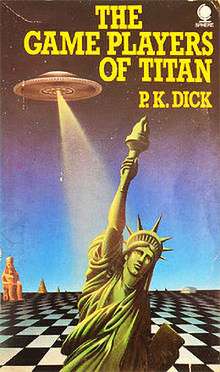 I’m an unabashed fan of Philip K. Dick (1928-1982), in my opinion one of the most inventive science fiction writers of his generation, which was a very strong generation for sci fi.
I’m an unabashed fan of Philip K. Dick (1928-1982), in my opinion one of the most inventive science fiction writers of his generation, which was a very strong generation for sci fi.
Many of his books seem to be generated by a single central idea, off which he then spins speculative stories that often explore human psychology and social behaviours.
What if androids were so convincing they didn’t know they were androids? What if Hitler won World War II? What if God was a vast active living intelligence system orbiting Earth?
In the case of The Game Players of Titan, first published in 1963, this idea might be described as “How could you bluff someone who can read your mind?”
To answer this, Dick creates a future post-apocalyptic scenario in which the earth’s population has been decimated, aliens called vugs from Titan (the largest of Saturn’s moons) rule in a kind of benevolent dictatorship, and the few of the remaining population who are land owners play a board game in which they can bluff each other to win and lose property – as well partners, with whom they hope to have “luck” to procreate and repopulate Earth.
Our hero, Pete Garden, is one such “bindman”, who loses Berkeley in California and his wife in one disastrous Game. Events spin off from that night that introduce Garden to an underground of people with various telepathic, telekinetic and other psionic powers, vugs disguised as humans, various drugs and medications, murders and both terrestrial and extra-terrestrial mayhem, culminating in a session of the Game for the highest possible stakes.
In the process, we get to explore a range of questions related to psionics. Is it possible that, deep down, everyone is a bit telepathic? How do telepaths deal with reading the parts of people’s minds that are usually deeply repressed? What happens when two telepaths read each other’s minds? Is it possible to enhance or repress psionic powers through the use of pharmaceuticals?
As is often the case with Dick novels, the small details are often extremely entertaining and provocative. In this book, for example, the Rushmore Effect allows non-organic entities to speak, from elevators to flying cars to drug stores. Heat-needles are deadly weapons left over from the war that wiped out most of the population. Automated mobile newspaper vending machines are “homotropic”, seeking out people to sell to. With the aid of medications, our hero has reached the not-unusual age of a very fit 140 years, which doesn’t stop him being attracted to an 18 year old.
The Game Players of Titan is not regarded as one of PKD’s major works, unlike the 23 short stories and novels that have been turned into TV episodes or movies like Blade Runner, Total Recall, Minority Report, or The Man in the High Castle.
Nevertheless, it’s a great read – just 157 pages in paperback – that will take you to a future world as compelling and thought-provoking as anything dreamt up by Asimov, Bradbury, Heinlein or Clarke.